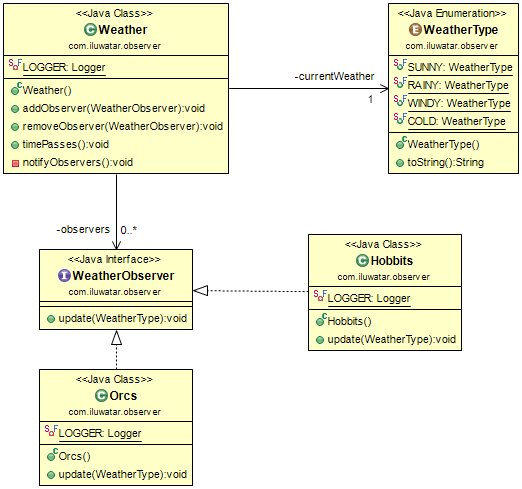Observer
También conocido como
Dependents, Publish-Subscribe
Propósito
Defina una dependencia de uno a muchos entre objetos para que cuando un objeto cambie de estado, todos sus dependientes sean notificados y actualizados automáticamente.
Explicación
Ejemplo real
En una tierra muy lejana viven las razas de los hobbits y los orcos. Ambos viven principalmente al aire libre, por lo que siguen de cerca los cambios meteorológicos. Se podría decir que observan constantemente el tiempo.
En palabras simples
Se registran como observadores para recibir los cambios de estado del objeto.
Wikipedia dice
El patrón observador es un patrón de diseño de software en el que un objeto, llamado sujeto, mantiene una lista de sus dependientes, llamados observadores, y les notifica automáticamente cualquier cambio de estado, normalmente llamando a uno de sus métodos.
Ejemplo programático
Presentemos primero la interfaz WeatherObserver y nuestras razas, Orcs y Hobbits.
public interface WeatherObserver {
void update(WeatherType currentWeather);
}
@Slf4j
public class Orcs implements WeatherObserver {
@Override
public void update(WeatherType currentWeather) {
LOGGER.info("The orcs are facing " + currentWeather.getDescription() + " weather now");
}
}
@Slf4j
public class Hobbits implements WeatherObserver {
@Override
public void update(WeatherType currentWeather) {
switch (currentWeather) {
LOGGER.info("The hobbits are facing " + currentWeather.getDescription() + " weather now");
}
}
}Luego está el clima Weather, que cambia constantemente.
@Slf4j
public class Weather {
private WeatherType currentWeather;
private final List<WeatherObserver> observers;
public Weather() {
observers = new ArrayList<>();
currentWeather = WeatherType.SUNNY;
}
public void addObserver(WeatherObserver obs) {
observers.add(obs);
}
public void removeObserver(WeatherObserver obs) {
observers.remove(obs);
}
/**
* Makes time pass for weather.
*/
public void timePasses() {
var enumValues = WeatherType.values();
currentWeather = enumValues[(currentWeather.ordinal() + 1) % enumValues.length];
LOGGER.info("The weather changed to {}.", currentWeather);
notifyObservers();
}
private void notifyObservers() {
for (var obs : observers) {
obs.update(currentWeather);
}
}
}Aquí está el ejemplo completo en acción.
var weather = new Weather();
weather.addObserver(new Orcs());
weather.addObserver(new Hobbits());
weather.timePasses();
weather.timePasses();
weather.timePasses();
weather.timePasses();Salida del programa:
The weather changed to rainy.
The orcs are facing rainy weather now
The hobbits are facing rainy weather now
The weather changed to windy.
The orcs are facing windy weather now
The hobbits are facing windy weather now
The weather changed to cold.
The orcs are facing cold weather now
The hobbits are facing cold weather now
The weather changed to sunny.
The orcs are facing sunny weather now
The hobbits are facing sunny weather nowDiagrama de clases

Aplicabilidad
Utilice el patrón Observador en cualquiera de las siguientes situaciones:
- Cuando una abstracción tiene dos aspectos, uno dependiente del otro. Encapsular estos aspectos en objetos separados te permite variarlos y reutilizarlos independientemente.
- Cuando un cambio en un objeto requiere cambiar otros, y no sabes cuántos objetos necesitan ser cambiados.
- Cuando un objeto debe ser capaz de notificar a otros objetos sin hacer suposiciones sobre quiénes son estos objetos. En otras palabras, no quieres que estos objetos estén estrechamente acoplados.